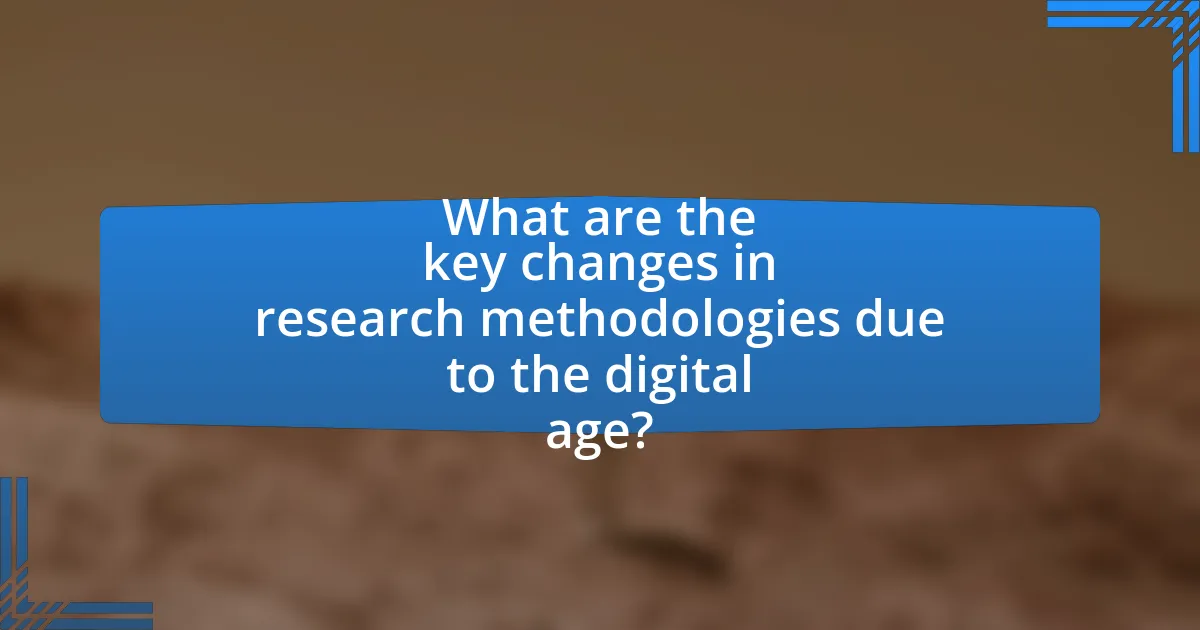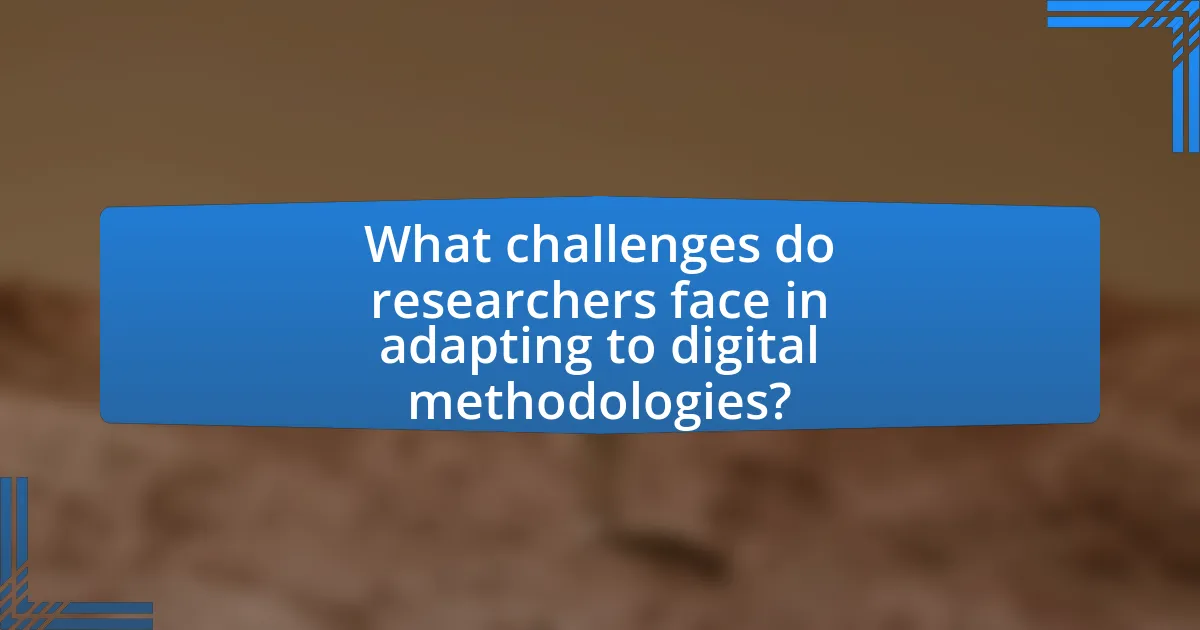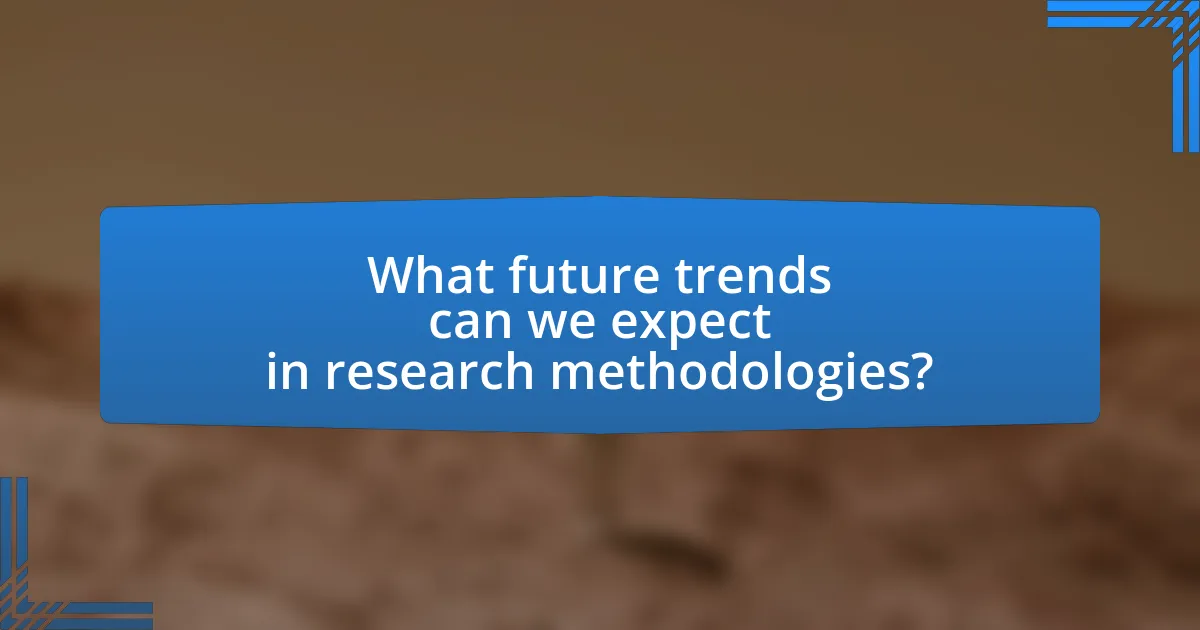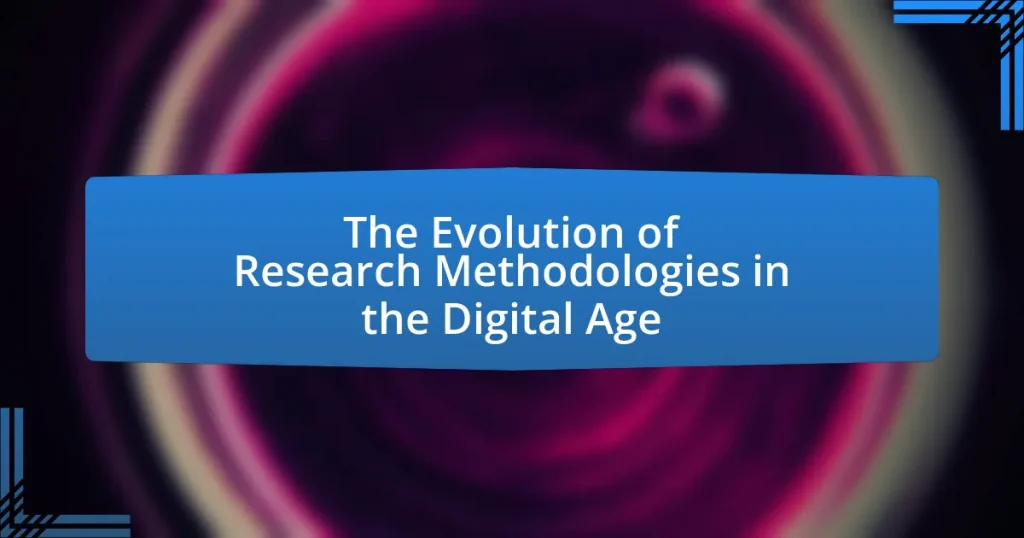The article examines the evolution of research methodologies in the digital age, highlighting key changes such as the integration of big data analytics, online surveys, and collaborative tools. It discusses how technology has transformed traditional research methods by enhancing data collection, analysis, and dissemination processes. Specific technologies like artificial intelligence and cloud computing are identified as pivotal in improving research efficiency and accuracy. The article also addresses challenges researchers face in adapting to digital methodologies, including ethical considerations and the need for new analytical skills, while outlining best practices for conducting research in this evolving landscape.

What are the key changes in research methodologies due to the digital age?
The key changes in research methodologies due to the digital age include the increased use of big data analytics, online surveys, and collaborative tools. Researchers now leverage vast datasets generated from digital interactions, enabling more comprehensive analyses and insights. For instance, the ability to conduct online surveys allows for quicker data collection from diverse populations, enhancing the representativeness of research findings. Additionally, digital collaboration platforms facilitate real-time communication and data sharing among researchers, leading to more efficient project management and interdisciplinary approaches. These methodologies reflect a shift towards more agile, data-driven, and collaborative research practices, aligning with the rapid advancements in technology and information accessibility.
How has technology influenced traditional research methods?
Technology has significantly influenced traditional research methods by enhancing data collection, analysis, and dissemination processes. Digital tools such as online surveys, databases, and statistical software have streamlined the gathering of large datasets, allowing researchers to access information more efficiently than traditional paper-based methods. For instance, the use of platforms like Google Scholar and JSTOR has made it easier for researchers to find and cite relevant literature, increasing the breadth and depth of their studies. Additionally, advancements in data analytics and machine learning enable researchers to analyze complex datasets quickly, leading to more accurate and insightful conclusions. This shift towards technology-driven methodologies has transformed the landscape of research, making it more accessible and efficient.
What specific technologies have transformed research methodologies?
Specific technologies that have transformed research methodologies include big data analytics, artificial intelligence, and cloud computing. Big data analytics enables researchers to process and analyze vast amounts of data quickly, leading to more informed conclusions. Artificial intelligence enhances data interpretation through machine learning algorithms, allowing for predictive modeling and pattern recognition. Cloud computing facilitates collaboration and data sharing among researchers across the globe, streamlining the research process. These technologies have significantly improved the efficiency, accuracy, and scope of research methodologies in various fields.
How do these technologies enhance data collection and analysis?
Technologies enhance data collection and analysis by automating processes, increasing accuracy, and enabling real-time insights. Automation tools reduce human error and streamline data gathering, allowing researchers to focus on interpretation rather than collection. For example, machine learning algorithms can analyze vast datasets quickly, identifying patterns that would be difficult for humans to discern. Additionally, technologies like big data analytics facilitate the processing of large volumes of information, leading to more comprehensive analyses. According to a report by McKinsey, organizations that leverage big data analytics can improve their productivity by up to 6%. This demonstrates that the integration of advanced technologies significantly improves the efficiency and effectiveness of data collection and analysis in research methodologies.
What new research methodologies have emerged in the digital age?
New research methodologies that have emerged in the digital age include big data analytics, online surveys, and mixed methods research. Big data analytics allows researchers to analyze vast amounts of data from various digital sources, providing insights that traditional methods cannot achieve. Online surveys have become prevalent due to their efficiency and ability to reach diverse populations quickly, enabling researchers to gather data from a global audience. Mixed methods research combines qualitative and quantitative approaches, leveraging the strengths of both to provide a more comprehensive understanding of research questions. These methodologies reflect the shift towards data-driven research practices facilitated by technological advancements.
What are the characteristics of digital research methodologies?
Digital research methodologies are characterized by their reliance on digital tools and platforms for data collection, analysis, and dissemination. These methodologies often incorporate techniques such as online surveys, social media analytics, and big data analysis, enabling researchers to gather large volumes of data quickly and efficiently. Additionally, they emphasize the use of collaborative tools that facilitate real-time communication and data sharing among researchers, enhancing the research process. The integration of advanced technologies, such as artificial intelligence and machine learning, further allows for sophisticated data analysis and pattern recognition, making digital methodologies highly adaptable to various research contexts.
How do these methodologies differ from traditional approaches?
These methodologies differ from traditional approaches primarily in their reliance on digital tools and data analytics. Traditional research methods often depend on qualitative data collection techniques, such as interviews and surveys, which can be time-consuming and limited in scope. In contrast, modern methodologies leverage big data, machine learning, and real-time analytics to gather and analyze vast amounts of information quickly and efficiently. For example, a study by the Pew Research Center in 2021 highlighted that digital methodologies can process data from millions of online interactions, providing insights that traditional methods cannot achieve in the same timeframe. This shift allows for more dynamic and responsive research, adapting to emerging trends and patterns in real-time.

What challenges do researchers face in adapting to digital methodologies?
Researchers face several challenges in adapting to digital methodologies, including technological proficiency, data privacy concerns, and the need for new analytical skills. Technological proficiency is essential, as many researchers may lack the necessary skills to effectively use digital tools and platforms, which can hinder their ability to conduct research efficiently. Data privacy concerns arise from the increased use of digital data, necessitating adherence to regulations such as GDPR, which can complicate data collection and sharing processes. Additionally, researchers must develop new analytical skills to interpret large datasets generated by digital methodologies, as traditional research training may not adequately prepare them for this shift. These challenges highlight the complexities involved in transitioning to digital research practices.
What ethical considerations arise with digital research methods?
Ethical considerations in digital research methods include issues of privacy, consent, and data security. Researchers must ensure that participants’ personal information is protected and that they have obtained informed consent before collecting data. For instance, the General Data Protection Regulation (GDPR) mandates strict guidelines on data handling and participant rights in the European Union, emphasizing the importance of transparency and accountability in research practices. Additionally, the potential for data misuse or breaches raises concerns about the ethical responsibility researchers have to safeguard sensitive information.
How do privacy concerns impact research design?
Privacy concerns significantly impact research design by necessitating the incorporation of ethical guidelines and data protection measures. Researchers must ensure that participant data is anonymized and securely stored to comply with regulations such as the General Data Protection Regulation (GDPR). This often leads to the adoption of methodologies that prioritize informed consent and transparency, which can limit the scope of data collection and influence the types of questions that can be ethically explored. For instance, studies involving sensitive information may require additional layers of approval and oversight, thereby extending the research timeline and increasing costs.
What measures can be taken to ensure ethical compliance?
To ensure ethical compliance, organizations should implement comprehensive training programs that educate employees about ethical standards and legal requirements. These programs should include case studies and real-world scenarios to illustrate the importance of ethical behavior in research methodologies. Additionally, establishing a robust framework for reporting unethical behavior, such as anonymous hotlines, encourages transparency and accountability. Regular audits and assessments of research practices can further identify potential ethical breaches, ensuring adherence to established guidelines. Research indicates that organizations with strong ethical compliance programs experience fewer legal issues and enhanced reputational integrity, reinforcing the necessity of these measures in the digital age.
How do researchers maintain data integrity in digital environments?
Researchers maintain data integrity in digital environments by implementing rigorous data management practices, including validation, encryption, and regular audits. These practices ensure that data remains accurate, consistent, and secure throughout its lifecycle. For instance, data validation techniques, such as checksums and data entry protocols, help identify and correct errors during data collection and processing. Additionally, encryption safeguards sensitive information from unauthorized access, while regular audits assess compliance with data integrity standards. These methods collectively reinforce the reliability of research findings in the digital age.
What best practices can be implemented for data management?
Best practices for data management include establishing clear data governance policies, implementing data quality controls, and utilizing secure data storage solutions. Clear data governance policies ensure that roles and responsibilities are defined, which enhances accountability and compliance with regulations such as GDPR. Data quality controls, such as regular audits and validation processes, help maintain the accuracy and reliability of data, which is crucial for effective decision-making. Secure data storage solutions, including encryption and access controls, protect sensitive information from unauthorized access and breaches, thereby safeguarding organizational integrity. These practices collectively enhance the efficiency and security of data management in research methodologies.
How can researchers address issues of data reliability and validity?
Researchers can address issues of data reliability and validity by implementing rigorous methodological frameworks and employing statistical techniques. For instance, using triangulation, which involves cross-verifying data from multiple sources or methods, enhances the credibility of findings. Additionally, conducting pilot studies can help identify potential biases and refine data collection instruments, ensuring they accurately measure the intended constructs. Furthermore, researchers can apply statistical tests, such as Cronbach’s alpha, to assess the internal consistency of measurement tools, thereby confirming their reliability. These strategies are supported by empirical evidence, such as a study published in the Journal of Research Practice, which highlights that systematic approaches to data collection significantly improve the reliability and validity of research outcomes.

What future trends can we expect in research methodologies?
Future trends in research methodologies will increasingly emphasize the integration of artificial intelligence and machine learning to enhance data analysis and interpretation. These technologies enable researchers to process vast amounts of data more efficiently, leading to more accurate insights and predictions. For instance, a study published in the journal “Nature” in 2021 highlighted how AI algorithms can identify patterns in complex datasets that traditional methods may overlook, thus improving the quality of research outcomes. Additionally, there is a growing trend towards open science practices, which promote transparency and collaboration among researchers, as evidenced by the increasing number of open-access journals and data-sharing platforms. This shift not only fosters reproducibility but also accelerates the pace of scientific discovery.
How will artificial intelligence shape future research practices?
Artificial intelligence will significantly shape future research practices by enhancing data analysis, automating repetitive tasks, and facilitating more complex simulations. AI algorithms can process vast amounts of data quickly, identifying patterns and insights that human researchers might overlook, thereby accelerating the pace of discovery. For instance, a study published in Nature in 2020 demonstrated that AI could analyze genomic data to identify potential drug targets faster than traditional methods. Additionally, AI tools can automate literature reviews and data collection, allowing researchers to focus on hypothesis generation and interpretation. This shift not only increases efficiency but also improves the accuracy of research outcomes, as evidenced by the use of AI in clinical trials, which has shown to reduce time and costs while increasing participant safety.
What roles will AI play in data analysis and interpretation?
AI will play several critical roles in data analysis and interpretation, including automating data processing, enhancing predictive analytics, and improving data visualization. By automating data processing, AI can efficiently handle large datasets, reducing the time required for data cleaning and preparation. For instance, machine learning algorithms can identify patterns and anomalies in data, which aids in predictive analytics by forecasting trends and outcomes based on historical data. Furthermore, AI-driven tools can create dynamic visualizations that make complex data more accessible and understandable, facilitating better decision-making. According to a report by McKinsey, organizations that leverage AI for data analysis can improve their productivity by up to 40%, demonstrating the significant impact AI has on enhancing data-driven insights.
How can AI enhance the efficiency of research processes?
AI can enhance the efficiency of research processes by automating data collection and analysis, thereby reducing the time researchers spend on these tasks. For instance, AI algorithms can quickly sift through vast amounts of literature, identifying relevant studies and extracting key information, which accelerates the literature review process. According to a study published in the journal “Nature,” AI tools can analyze data sets up to 100 times faster than traditional methods, significantly speeding up research timelines. Additionally, AI can assist in predictive analytics, helping researchers identify trends and make informed decisions based on data-driven insights. This capability not only streamlines the research workflow but also improves the accuracy of findings, as evidenced by a report from the McKinsey Global Institute, which states that organizations using AI in research have seen productivity increases of 20-30%.
What skills will researchers need to thrive in the digital age?
Researchers will need strong data analysis skills to thrive in the digital age. As vast amounts of data are generated, the ability to interpret and analyze this data using statistical tools and software becomes essential. Proficiency in programming languages such as Python or R, which are commonly used for data manipulation and analysis, is increasingly important. Additionally, familiarity with digital research tools and platforms, such as online databases and collaborative software, enhances researchers’ efficiency and productivity. A study by the Pew Research Center indicates that 76% of researchers believe that digital skills are crucial for their work, highlighting the necessity of adapting to technological advancements in research methodologies.
How can researchers develop digital literacy and technical skills?
Researchers can develop digital literacy and technical skills by engaging in targeted training programs and utilizing online resources. These programs often include workshops, webinars, and courses focused on data analysis, software tools, and digital communication platforms. For instance, the Digital Literacy Framework by the Association of College and Research Libraries outlines essential competencies that researchers can acquire through structured learning. Additionally, hands-on experience with digital tools, such as statistical software or content management systems, enhances practical skills. Studies indicate that researchers who participate in continuous professional development are more adept at navigating digital environments, thereby improving their overall research effectiveness.
What training resources are available for researchers transitioning to digital methodologies?
Training resources available for researchers transitioning to digital methodologies include online courses, workshops, and webinars offered by various institutions and organizations. For instance, platforms like Coursera and edX provide courses on data analysis, digital tools, and research methods tailored for digital environments. Additionally, organizations such as the American Educational Research Association (AERA) and the International Society for Technology in Education (ISTE) offer specialized training sessions and resources focusing on digital research techniques. These resources are designed to equip researchers with the necessary skills to effectively utilize digital tools and methodologies in their work.
What are the best practices for conducting research in the digital age?
The best practices for conducting research in the digital age include utilizing diverse digital tools, ensuring data credibility, and maintaining ethical standards. Researchers should leverage online databases, academic journals, and digital libraries to access a wide range of information efficiently. For instance, platforms like Google Scholar and JSTOR provide peer-reviewed articles that enhance the reliability of research findings. Additionally, verifying the credibility of sources is crucial; researchers should assess the author’s qualifications, publication date, and the journal’s impact factor to ensure the information is accurate and relevant. Ethical considerations, such as proper citation and adherence to data privacy regulations, are also essential to uphold integrity in research. Following these practices leads to more robust and trustworthy research outcomes in the digital landscape.


